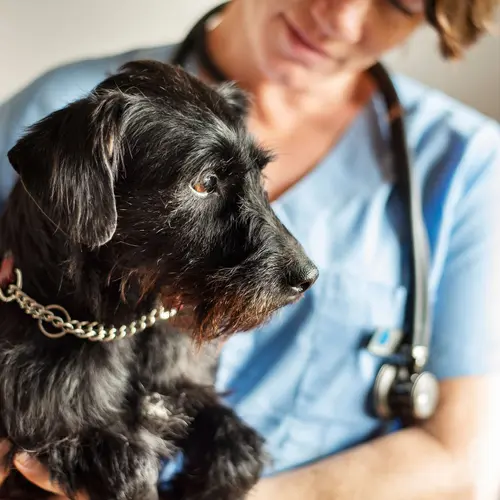Inflammatory bowel disease (IBD) is a condition in which your dog’s intestine or digestive tract becomes inflamed consistently. The continuing inflammation damages the lining of their digestive tract in a way that prevents food from being properly digested. It can also lead to other health problems if nutrients are not absorbed as they should be.
While the symptoms are similar for IBD and irritable bowel syndrome (IBS), the two conditions are very different. Inflammatory bowel disease is a physical abnormality — the presence of an overgrowth of abnormal inflammatory cells. Irritable bowel syndrome is usually caused by stress, changes in diet, or infection, and primarily affects the large intestine.
What Causes IBD?
There is no one cause of IBD in dogs, and the condition is not clearly understood by veterinarians. They suspect that IBD may actually be the body’s response to other underlying conditions. Causes may include:
- Genetic markers
- Food allergies
- Parasites
- Bacteria
- Weak immune system
What Are the General Symptoms of IBD?
The location within the digestive tract and the severity of inflammation affect symptoms of IBD in dogs.
Chronic vomiting. If your dog’s stomach is inflamed, it can lead to chronic vomiting. While their symptoms may not seem to have any identifiable cause, there may be a pattern in certain food or treats that irritate the condition.
Chronic diarrhea. If inflammation is primarily located in the small intestine, your dog may have diarrhea or the presence of blood and mucus in their poop. While occasional diarrhea and mucus are normal, blood is always considered an emergency.
Weight Loss. If your dog has unexplained weight loss, they may not be eating because of their IBD symptoms. If you notice a decrease in your dog’s appetite that is causing weight loss, talk to your veterinarian.
They may seem lethargic or have a slight change in appetite if their inflammation is mild or in beginning stages of the condition. Early intervention is key for addressing IBD in dogs. Any changes in your dog’s bowel habits or appetite that persist for more than a couple of days are cause for concern and should be addressed with your veterinarian.
How Is IBD Diagnosed?
Your veterinarian will ask questions about your dog’s condition symptoms. If they suspect your dog is suffering from IBD, the condition requires a biopsy of the intestine lining for a diagnosis. The biopsy will confirm the presence of inflammatory cells as well as show how severe the condition is.
Before completing a more invasive biopsy, blood work and a fecal exam may be completed. Ultrasounds and x-rays are also common if your dog’s veterinarian suspects IBD. These can help to rule out other possibilities like parasites, cancer, or illness.
Which Dogs Are Prone to IBD?
Any dog can have IBD, but there are some breeds that receive a diagnosis more than others, including:
- Weimaraner
- Basenji
- Soft-coated wheaten terriers
- Irish setters
- Yorkshire terriers
- Rottweiler
- German shepherd
- Norweigian lundehund
- Border collie
- Boxer
How Is IBD Treated?
There is no cure for IBD, but the condition can be managed through prescription medication like antibiotics and steroids and changes in diet. Since each dog and their case of IBD is different, the condition can take some trial-and-error to find the right treatment plan.
Keep in mind that it could take several weeks to see an improvement. Be patient with your pet as you try new things to help improve their condition. It helps to take detailed notes on their diet and other habits. Make note of:
- Are they eating more or less?
- Is their weight changing?
- Do they seem happier and more playful?
- Are they vomiting or having diarrhea more or less often?
Once you find something that works for your dog, their intestines can begin to heal. Eventually, your dog may reach the point that they are no longer reliant on medication every day. Instead, you can reserve their prescription for bad days when they have a flare-up of IBD.
What Should I Feed My Dog With IBD?
Using lab results from blood work, fecal examination, and intestinal biopsy, your vet will make a diet recommendation. This may include:
- Special dog food that is high in fiber
- Removing a food allergen from your pet’s diet
- Eliminating treats or other foods from their diet
- Reducing the number of carbs your dog eats
- Eliminating fat from your dog’s diet
To consider your efforts a true “food trial,” you should commit to a regimen for 6 to 12 weeks. If you don’t see enough of an improvement, your vet may suggest a small tweak or addition to your dog's diet to see if you notice any changes — good or bad.
When Is It Time to See The Vet?
Vomiting or diarrhea that persist longer than a few days without an identifiable cause will likely require a vet visit. You may notice blood in their stool or vomit if their condition has progressed.
Some dogs begin to eat and drink less in an effort to prevent their symptoms and end up losing weight. This can lead to lethargy and disinterest in playing. Any negative changes in your dog’s behavior that persist are a reason to visit your vet.
